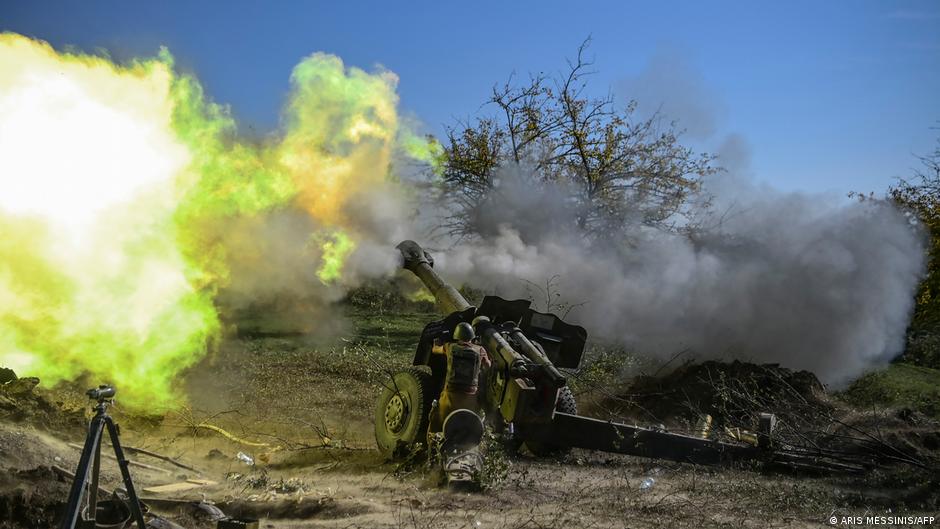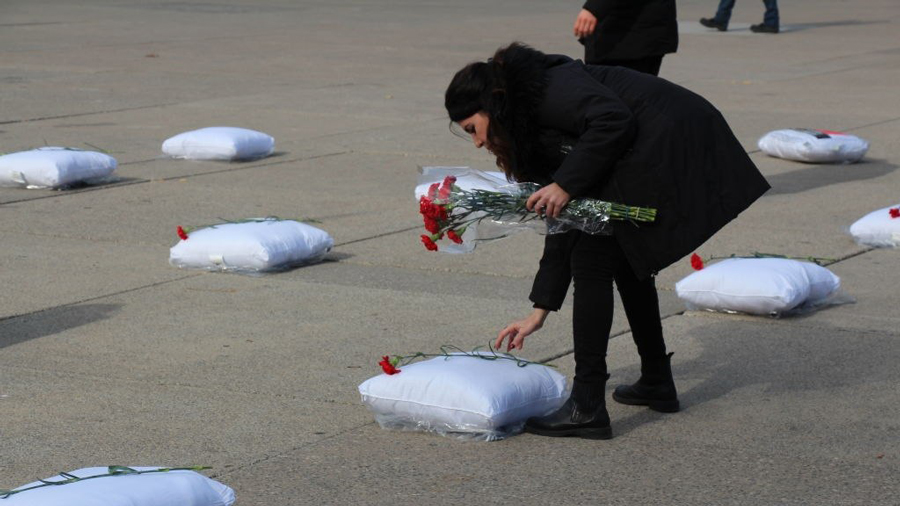Armenian and Azerbaijani soldiers exchanged artillery fire near Nagorno-Karabakh, prompting fears of escalation similar to the 2020 war. Both sides blamed each other for the initial provocations.Fighting between Armenia and Azerbaijan flared up again on Monday night, with both sides reporting intense artillery shelling.
At around midnight, Azerbaijani forces shelled Armenian troops at three locations along the border. Azerbaijan said it was responding to a buildup of Armenian landmines and weapons near the border.
Armenia fired back in retaliation.
The fighting took place near the Nagorno-Karabakh region, an area within Azerbaijan where ethnic Armenian separatists declared a breakaway republic — later known as Artsakh — in 1991.
At a press briefing early on Tuesday, Armenian defense spokesperson Aram Torosyan said the situation remains "extremely tense" as fighting continues.
Armenian Prime Minister Nikol Pashinyan later told parliament that "For the moment, we have 49 [troops] killed and unfortunately it's not the final figure."
Armenia, Azerbaijan trade blame for violence
Both countries claimed to have launched proportionate responses against what they saw as provocations from the other side.
"At 00:05 a.m. [local time] on Tuesday, Azerbaijan launched intensive shelling, with artillery and large-caliber firearms, against Armenian military positions in the direction of the cities of Goris, Sotk, and Jermuk," Armenia's defense ministry said.
However, Azerbaijan accused Armenian forces of carrying out "large-scale subversive acts" earlier on Monday night near the border districts of Dashkesan, Kelbajar and Lachin by placing landmines and mobilizing weapons.
"The countermeasures taken by the Azerbaijani military in response to the provocation by the Armenian military are local and directed against legitimate military objects that serve as firing points," Azerbaijan's defense ministry added.
Armenian forces said they subsequently launched a "proportionate" response. The Azerbaijani defense ministry said its troops came under "intense shelling from weapons of various caliber, including mortars, by units of the Armenian army."
Both sides acknowledged troop casualties but did not confirm numbers.
US calls for end to fighting
Armenia has said it will appeal to the Russian-led Collective Security Treaty Organization (CSTO) — a security bloc of former Soviet states — as well as the UN Security Council.
Prime Minister Pashinyan called Russian President Vladimir Putin to discuss the outbreak of violence. He also called French President Emmanuel Macron and US Secretary of State Antony Blinken.
Pashinyan's office said the calls were made to inform the leaders "of Azerbaijan's aggressive acts against Armenia's sovereign territory" and to demand an "adequate reaction of the international community."
The US has called for an end to the clashes.
"As we have long made clear, there can be no military solution to the conflict," Blinken said in a statement. "We urge an end to any military hostilities immediately."
Turkey — a close ally of Azerbaijan — blamed Armenia for the outbreak of violence and called for peace negotiations.
"Armenia should cease its provocations & focus on peace negotiations and cooperation [with] Azerbaijan," Foreign Minister Mevlut Cavusoglu wrote on Twitter.
Long-running feud over Nagorno-Karabakh
The ethnically Armenian enclave of Nagorno-Karabakh was the site of two wars between Azerbaijan and Armenia in recent decades.
The territory was controlled by Armenian separatists for almost 30 years until Azerbaijan regained control of most of the territory after a six-week war in 2020 and a ceasefire agreement brokered by Russia.
Last week, Armenia accused Azerbaijan of killing one of its soldiers in a border shootout, while Azerbaijan has also accused Armenia of firing at its troops in recent months.












